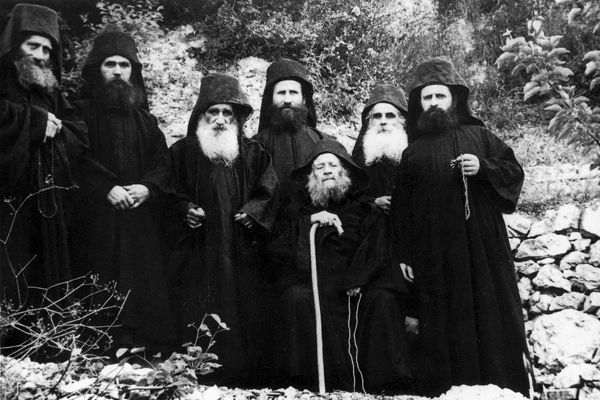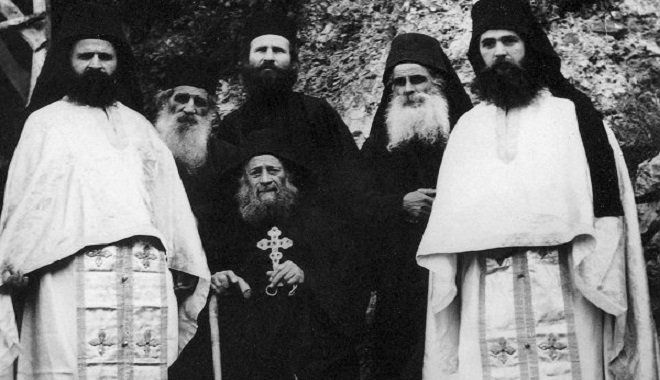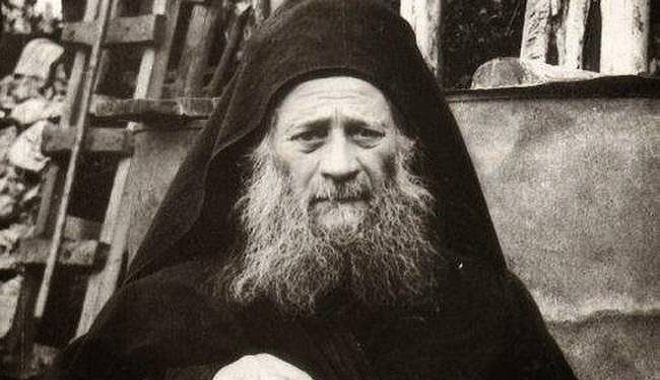Nikos I. Nikolaidis, Omot. Professor of Patristic Theology at the Theological School of the University of Athens
" Give me the Spirit and give me speech" (PG 36, 436). This direct theological quote by Gregory the Theologian fully corresponds to the person and words of Elder Joseph of Hesychast. The Elder was "God-inspired", of course, a person of speech. His discovered manuscript Epistles (132+1 to Anonymous Monahon and his 12 Poems) are full of spelling atypicalities. However, beyond this lag, his work is full of reason and grace.
And the Elder recognizes this and testifies: "I, though illiterate, attempt this (to write to you), finding the measure of my incapacity and ignorance, I believe in the wishes of my Fathers, God helping me... I begin" (p. 436 ). Yes, what he writes, as he observes, "are not simple words, but are reasons for action of Holy Fathers enlightened by Divine Grace, from which he was taught and some of the fruits of these were grown. And as illiterate as I am, I put in a lot of work... and in the farming of them, even blood was given. And now I assign it... as a bank... or as a terpnon paradise..." (p. 437).
And, let it not seem strange. All our Saints and Fathers, as well as the Elder, have an intense desire for the eternal Homeland, which we lost through disobedience. The Elder is not a Theological School graduate. However, his discourses are mediated by patristic and empirical theology.
Really, how many graduates of Theological Schools could, with the simplicity and clarity that characterize Elder Joseph, interpret, like him, original sin? "... and to flee from the fruit of knowledge, where the Forefathers ate and died... (advises)... Lord, protect us from the forbidden fruit, and through you, our sweet God, may we be enlightened..." (p. 437), he writes. And this interpretation is perfectly aligned with that of Saint John of Damascus, who explains that "the tree of knowledge", "they partake of the knowledge of their own nature" (PG 94, 913AB). But what does this mean? That the Protoplasts overestimated "the counsel of the serpent", themselves or even attempted their equality with God! And, thus, instead of wanting to know "the beautiful fruit of the tree of life", i.e. God the Word, according to Saint Methodius of Olympus (PG 19, 1843), they despised him. How, beautifully and very simply, the Elder puts this: "(try to) cut some of these (many trees)", so that they lead you to "our sweetest God", he says (p. 437). Yes, Paradise was full of many kinds of trees. Through the richness of creation man would be brought back to God. This is exactly what the holy Damascenus interprets, whom the Elder seems to have in mind, when, defining the "tree of life", he writes: This tree meant "the divine meaning inferred from all the senses and the on the generative answers, and the generative cause reduction" (i.e. God the Word) (PG 94, 917B).

How vividly the Elder explains this in another connection as well! So he writes: "And the first theory is (the) of beings" (p. 247). Yes. The study of beings leads to the greatness of God on the one hand, and on the other it testifies to the greatness of man, that is, for him the world was made; "as God made all things through man" (p. 247) , he explains.
And following our holy Fathers, he teaches about man, the Elder, that he is superior even to the Angels. Thus, it is addressed to the Bryaini Nun: "O miracle of miracles! ... we (God) claim to be with our Virgin Mary, as her genuine children, superior to the Holy Angels..." (p. 309). Or "God created all things for man and added these Angels to his ministry" (p. 247). And this qualification and privilege exists in man, due to his construction and his unique destiny. Adam, he says, was created "in the image of God" (p. 128) and bears the body, which is "a creature of God" (p. 383), and the derivative of God's breath, i.e. the soul (p. 409). This "animal-creating spirit", according to Saint Gregory Palamas, makes man the most wonderful of the Angels (P. K. CHRISTOU, vol. V, p. 56). And this creation of man makes him a "son" of God and a "god by grace" (p. 247). And thus man becomes a "relative" of God, "not essentially", clarifies the Elder (p. 412). And this anthropological observation alone qualifies the Elder as an empirical theologian, in the sense that he can speak about the distinction of substance and energy in God. A key chapter, for which Saint Gregory Palamas fought and fought. However, after the economy in Christ, man, and according to Saint John the Damascene, is recognized, not only for his relationship with God in terms of energy, but also for his "substance (relative) society, due to his share in the mystery of the Eucharist (PG 94, 1348AB).
This, precisely, the important fact is captured and described by the Elder, when he talks about the three classes or states, where the divine Grace contributes to man, that is, purification, illumination and perfection (p. 245). Then, during the third stage, man is "in theory", where he observes, according to the Elder, "rapture of the mind, suspension of the senses, immobility and extreme silence of the members, union of God and man in one" (p. 172) · or, then, "as long as (man) is assimilated with God, where he is not known, one is not separated from the other, like the sun from light or fire from iron, when they are united" (p. 413). [Not in the sense of the disappearance of the human person, as Eastern religions teach. Because, even in the case of incandescent iron, the substance of iron remains]. (Cf. Isaac of Syria, Ascetics, p. 102). And, being thus, by divine grace, man is "raptured" and considers and hears "unspeakable words", as the Apostle Paul testifies (2 Corinthians 15:4).
And, having the above as an experiential experience, Elder Joseph exclaims: "But oh, sweet love of Christ! What good did you see from us?..." (p. 134). To illustrate in another of his Epistles: "O sweet love, Jesus, how much I owe thee!" (p. 442).
And all this happens, according to the Elder, because it is directly related to "the mystery of godliness (that) God was revealed in the flesh" (1 Tim. 3 16). This is how, among other things, the Elder sings in his fifteen-syllable iambic poem:
Wow, condescension! Wow, sympathy!
Vavai, maximum tolerance and long-suffering!
He who created the natures of angels
and with one look he rules this whole world
today he took on the nature of man... (p. 485).
And he involves, in this regard, in the "amazing mystery" of God's economy the person of the Most Holy Theotokos, because she (the Virgin Mary), according to St. Cyril of Alexandria, as the "relic of the world's peace" (PG 77, 992B), she is "the minister in the mystery of the incarnation of the Son and Word of God (PG 73, 229B). Thus, the Elder will theologize, to interpret that, "when we receive communion worthily,... let us eat the Body of Jesus and the Blood, which he received from the most precious blood of the Virgin Mary... (and) we become genuine children of the Virgin Mary... She it is the supernatural kinship, where we received from the Virgin Mary and our sweet Mother" (p. 174).
And this doctrinal approach of the Elder coincides completely, with the divine fact, that the Son and Word of God, being born man, received from the pure and innocent and spotless blood of the Virgin Mary and "recreated by himself, the blessing of God the Father and synergy of the Holy Spirit, his humanity" (Epiphaniou, 43, 157BC. Cf. Grigoriou Palamas, EPE, vol. 10, p. 446. Germanou Konstantinoupoleos, PG 98, 3970 etc.).

Being possessed by Charitos the Elder, how can he sperm in the face of death? The Elder lived the "orgy of the Saints", according to the scholar of the contemporary Osios, from the present life. His divine apparitions and divine visions, as well as his struggle against "spiritual wickedness" (Eph. v. 12) (p. 293), confirm the safe word. "After kissing her (the Virgin) many times, I got tired and sat down on the bench and fell asleep. And he came in a body, not an image, and kissed me, filling me with an ineffable fragrance. And the heavenly Baby was caressing me all over the face, I was kissing his chubby little hand, as it is alive, and like a mother is wrapped in Her arms... and don't say it while I'm alive, because I will certainly be tied up if anyone hears it" ( p. 265).
That is why, as he writes, "my children were crying" (p. 385) for his imminent death. But he, like another martyr Ignatius the Theophores, preferred death as a "dawn" to the other, indeed, life, and considered his earthly end, that "the present chief disciple is of Christ" (Ignatius, Epistle to the Romans, BEP, vol. 2, pp. 274-275). Thus, it is written: "And as soon as the sensible eyes close, the intelligibles open" (p. 143). And in another letter he explains: "....the eyes will be opened... to the other life. Then you will see parents, brothers, relatives. Then you will see Angels, Saints and the blessed Mother of all, pure Virgin and Theotokos, to whom we all call at every moment and to her we owe everything" (p. 135). That is why he recommends and explains about Liturgies and Memorials and their benefit (pp. 84, 85, 99, 350).
And his extreme humility, which contained him, "astonishes the mind and existing calculation", but also his grateful heart towards God's mercy. "... that the King wanted to take clay, mud from the borborus and place it near his throne... But can the clay be proud, because it is close to the King? No, but rather he admires the goodness of the King, that he did not forget the dirty clay, but brought him close to him" (p. 444).
From what, literally, "casting eyes and reeds", we have preliminarily quoted up to here, and which are indicative of the stature and theology of the Elder, it is delineated and demonstrated that his doctrine as a whole is not moralistic, nor is it intellectual. His dialectic is purely paternalistic, empirical and ontological. Adam's sin was not moral, as it is supposed by some; I wish it had been so. It was, unfortunately, ontological, since it interrupted and interrupted man's ontological-social and vital relationship with God, hence death. That is why the Elder speaks of a "kinship" relationship with God (p. 412) and "union" (p. 172) and "assimilation" (p. 413).
Christ's promise, "I came that I may have life and have it more abundantly" (John 10:10), constitutes and codifies the Elder's teaching. And in this sense are explained and understood his incessant and unceasing admonitions in his Epistles and Poems. Thus, for example, the Elder teaches and catechizes: "The foundation, of the life according to God, is the fear of God" (p. 258); or we make a "drop of obedience" (p. 143); or "obedience gives birth to humility" (p. 132); or "study and know" (p. 315) and "fight the flesh" (p. 264); or "say the prayer continually" (429); or "have a prayer schedule" (p. 350); or, that the role of "predilection" is crucial and important, both for sin and for spiritual life (pp. 170; 399; 483 et seq.). This delicate but great chapter "about pre-election" also concerns our Fathers, so that St. Cyril of Jerusalem says that "the Lord, recruiting souls, investigates pre-elections" (PG 33, 372D) and exclaims: "By pre-election evil' and not by nature (PG 33, 384A). At the same time, the Elder speaks of "afro" (2 Cor. 15:11) when he speaks of "tears" (p. 207); or that "my eyelids were defiled by excessive weeping all the time" (p. 105).
At the same time, some of his observations are noteworthy, which interpret the size and sharpness of his mind and the wit of his perception of various subjects. He writes, characteristically, and summarizes: "We did not inculcate the heavenly chosen philosophy (and here was meant that of M. Vassiliou, see Gregory the Theologian, Epitaph, PG36, 577B), probing into the depths of the divine mysteries, laboring in the wisdom of the divine, as far as possible taking care , so that we may understand things that are unattainable with the hands, but the mind is understood (and here he means the mind as the center of reference of the human person, that is, that it consents), the mind being humbled, God having a co-minister and guides Fiery angels speaking to us heavenly tribulation showing through a medium (sic) of consciousness" (p. 104).

In passing, - because this is necessary, since time and place, according to what is written, "fail me to speak" (Heb. 10:32)-, I feel the urge to make a statement of my soul, the following:
a. "I had expressed, when, as a speaker "On the Epistleography of the Elder Joseph of Hesychastos" at the two, regarding the Elder, Orthodox Scientific Conferences, Athens 2004 and Limassol 2005, and the necessity of collecting and publishing the entirety of the Elder's work. And I rejoice and express my particular admiration and appreciation, because that expectation is now becoming a reality with the publication and circulation of the 595-page volume: "Elder Joseph of Hesychast - Letters and Poems, 60 years since his sleep", in "Psychofeli Vatopedina 23" series, from the Holy Great Monastery of Vatopedi. Undoubtedly, this publication will benefit many. And this is the intent and purpose of the Publishers. And
b. My present, simple and meager approach, apart from its introductory character, has another important reason. And who is he? To highlight the size and quality of a contemporary Saint and Father of our Church and to interpret that Elder Joseph the Hesychast belongs to the choir of our great God-giving Fathers, in the sense that he was recognized and distinguished as a "vessel of divine grace", that in deed and reason he expresses and continues and highlights the Orthodox "way of godliness", according to St. Cyril of Jerusalem (PG 33, 456B), and that the whole output of his godly work is the Church's response to the challenges of our time to the Orthodox world, and not only.
Personally, I believe that with the Elder Joseph, above all, "the wilderness" (Is. 35, 2) of Monasticism "extinguished." And I have a strong feeling that the conscience of the pious crew of our Church, clergy and people, about the loyalty and fatherhood of Elder Joseph, advocates for his canonization. Of course, the competent ecclesiastical institutions have the say on the matter.
Let us have his wish.

